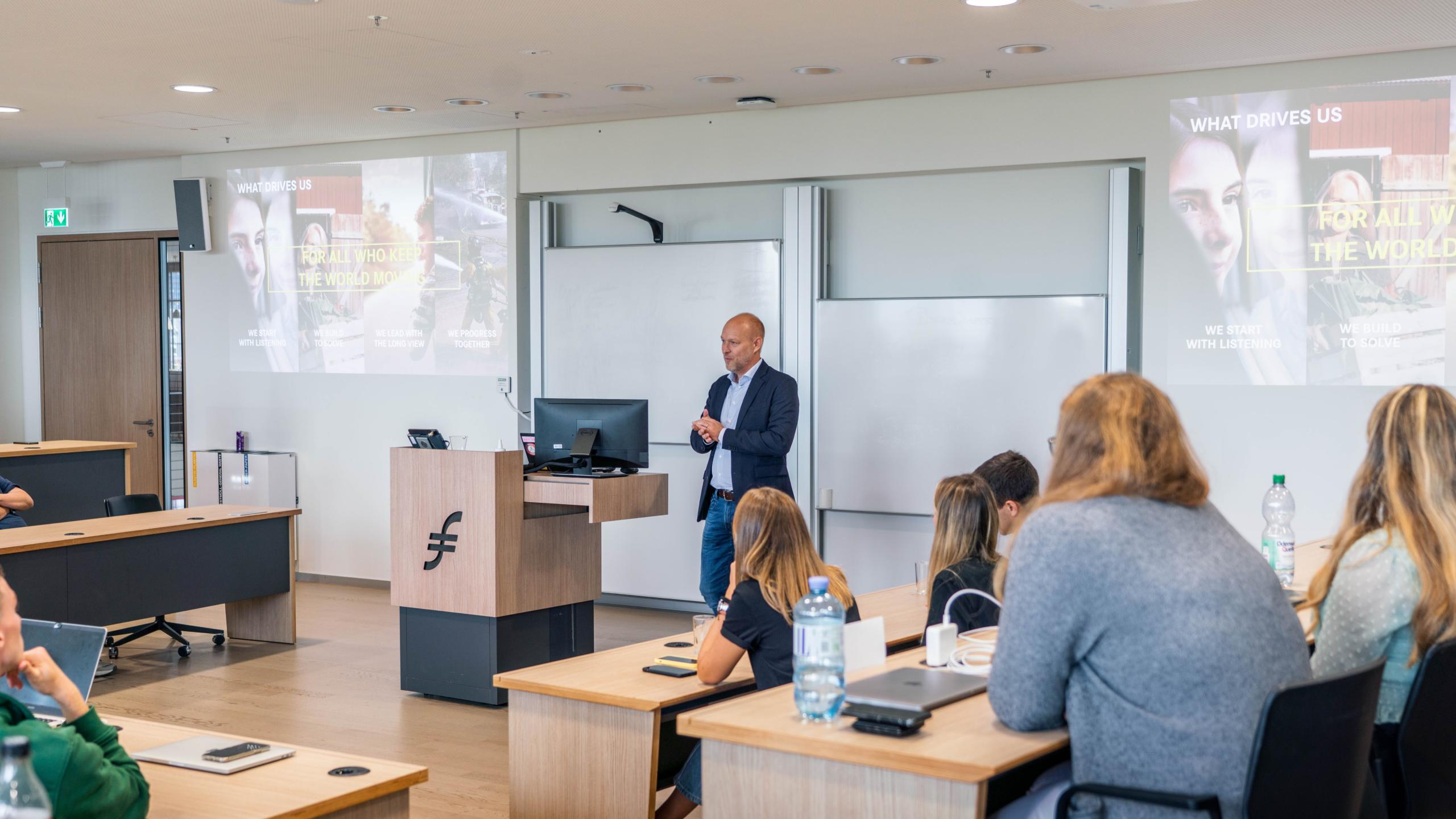"jcr:58465a1f-aaad-41e5-9f2d-fd988f329549" (String)
Wählen Sie Ihre Sprache
Master in Management

*zzgl. 400 EUR Einschreibegebühr und 100 EUR Bewerbungsgebühr
Unser Master in Management-Programm bietet eine Kombination aus innovativen Kernmodulen und innovativen Studienschwerpunkten, die essentielle Management- und Geschäftsentwicklungsfähigkeiten fördern. Das Programm ist darauf ausgelegt, Studierende darauf vorzubereiten, als digital versierte Analysten, ethisch verantwortungsbewusste Unternehmer, innovative Manager und globale Wirtschaftsführer erfolgreich zu sein.
Der Lehrplan bietet ein flexibles Drei-Tage-Modells, das Teilzeitarbeit neben dem Studium ermöglicht und so ein praxisnahes Lernen sicherstellt. Unsere Studierenden profitieren vom Zugang zum Entrepreneurship Accelerator oder Incubator für individuelle Mentoring-Möglichkeiten, einschließlich Networking mit Branchenexperten.
Unsere exklusiven Unternehmensverbindungen und das starke Alumni-Netzwerk ermöglichen es Ihnen, ein professionelles Netzwerk aufzubauen, das entscheidend für die Entwicklung Ihrer internationalen Karriere ist. Unser Career Services-Team unterstützt Sie mit individuellen Beratungen zur Karriereentwicklung, die auf Ihre Interessen und Ziele abgestimmt sind.
Rankings & Akkreditierungen

Die Frankfurt School ist eine der besten europäischen Business Schools. Akkreditiert von AACSB, EQUIS und AMBA, den drei führenden internationalen Verbänden von Business Schools, ist die Frankfurt School eine der wenigen Institutionen weltweit, die mit der sogenannten "Triple Crown“ ausgezeichnet wurde.

Der Studiengang Master in Management wird im Global Master in Management Ranking der Financial Times regelmäßig zu den besten in Deutschland und weltweit gezählt. Auch im Jahr 2025 gehören wir zu den besten Master in Management-Programmen in Deutschland.
Curriculum
Das Curriculum des Master in Management-Programms besteht aus Kernmodulen, richtungsweisenden Vertiefungen und praktischer Erfahrung durch Praktika, exklusive Jobangebote und die Teilnahme an Unternehmens- oder Beratungsprojekten, die durch das globale professionelle Netzwerk der Frankfurt School ermöglicht werden.

Lernziele
Expertenwissen und Verständnis von Managementtheorien und -konzepten, Prozessen und internationalen Best Practices
Absolventen werden über fundiertes Wissen und ein kritisches Verständnis von Managementtheorien, -konzepten, -prozessen und internationalen Best Practices verfügen. Sie werden in der Lage sein, komplexe managementbezogene Probleme in Geschäftskontexten zu analysieren, zu strukturieren und zu bewerten.
Problemlösung durch Anwendung analytischer Techniken
Absolventen werden sich kritisch mit komplexen Managementkonzepten, Theorien und Quellen auseinandersetzen, um durch die Anwendung wissenschaftlicher Methoden Einsichten zu gewinnen, die zur Verbesserung geschäftsbezogener Prozesse beitragen. Sie werden Forschungsziele ableiten, Forschungsmethoden anwenden, Ergebnisse beschreiben und Resultate erklären können.
Effektive Kommunikation und Zusammenarbeit
Absolventen werden effektive Kommunikatoren in interdisziplinären Forschungsfeldern und praktischen Geschäftskontexten sein. Sie werden verantwortungsbewusste Teammitglieder sein und durch effektive Zusammenarbeit gemeinsame Ziele erreichen. Sie erkennen potenzielle Konflikte in der Zusammenarbeit mit anderen und reflektieren diese im Kontext von situationsübergreifenden Bedingungen
Professionelles und verantwortungsbewusstes Verhalten
Absolventen werden darauf vorbereitet sein, kompetente Fachleute in internationalen Geschäftsumfeldern und Forschungseinrichtungen zu sein. Sie werden ihre beruflichen Aktivitäten auf fundiertes theoretisches und methodisches Wissen stützen und ein Verständnis für ethische Verantwortung in Management- und Entscheidungsprozessen entwickelt haben.
Master in Management Vertiefungen
Unsere Master in Management-Konzentrationen vermitteln spezielle Kenntnisse und Fähigkeiten in den Bereichen Global Strategy, Strategic Communication and Leadership, Digital Business, Technology & Operations sowie Data & Business Analytics. Durch diese Schwerpunkte und Unternehmensprojekte haben Sie die exklusive Möglichkeit, etablierte Konzerne und Start-ups zu besuchen.
Treffen Sie uns!
Beschäftigungsstatistik für den Jahrgang 2024
Einstiegsgehalt nach dem Abschluss: 67,900 EUR*
*inkl. Bonus & exkl. Auszubildende und Praktikanten
96% fanden innerhalb von 3 Monaten nach dem Abschluss eine Stelle.
Wo arbeiten die Absolventen?
Unsere Absolventen des Master in Management haben seit ihrem Abschluss Jobs in verschiedenen Unternehmen und Branchen gefunden.
Liste der Arbeitgeber
- 360T Treasury Systems AG
- Abbott Laboratories
- Aedifion GmbH
- Alvarez & Marsal
- AURICON Consulting GmbH
- Bankhaus Scheich Wertpapierspezialist AG
- BASF
- Boston Consulting Group
- Capco
- Carl Zeiss Vision International GmbH
- Check24
- CHOM CAPITAL GmbH
- CMS
- Commerzbank
- Concentrix GmbH
- Conves GmbH
- Deloitte
- Deutsche Bank
- Deutsche Börse Group
- EMPA - Data & Management Consulting GmbH
- EY
- GEODIS SA
- GetAway Group GmbH
- Hanseatic Tech Company
- Hikvision
- INVERTO
- KPMG
- LG Electronics
- Lucht Probst Associates GmbH
- Management Solutions
- Microsoft
- Netlight Consulting GmbH
- Nexi Group
- Oliver Wyman GmbH
- Porsche
- ProCredit Bank AG
- PwC Strategy& GmbH
- Rautenberg & Company GmbH
- Salm-Salm & Partner GmbH
- SMBC
- TX Group
- zeb
Land des Stelleneintritts
Lernerfahrung für den Master in Management
Praktisches Lernen
Die Frankfurt School legt großen Wert auf eine umfassende Ausbildung und der Master in Management bildet da keine Ausnahme. Innovative Lehrmethoden im Unterricht werden durch verschiedene Workshops und Aktivitäten ergänzt, um das gesamte Lernerlebnis zu verbessern.
Gastvorträge und Reden
Die starken Verbindungen der Frankfurt School zur Beratungs- und Finanzbranche bieten den Studierenden regelmäßige Gastvorträge, die wertvolle Möglichkeiten zum Networking mit Branchenführern und erfolgreichen Alumni bieten. Diese wertvollen Kontakte helfen den Studierenden, Einblicke zu gewinnen und langfristige Beziehungen aufzubauen, die für ihre zukünftige Karriere entscheidend sein werden.
German Classes
Der Master in Management wird vollständig auf Englisch unterrichtet. Für alle nicht deutschsprachigen Studierenden werden jedoch während des Programms zusätzlich Deutschkurse angeboten. Wir empfehlen unseren Studierenden dringend, vor ihrer Ankunft in Frankfurt Deutsch zu lernen, um ihre Beschäftigungsmöglichkeiten zu verbessern.
Fallstudien
Studierende profitieren von der exklusiven Möglichkeit, an Fallstudien in Vorlesungen und Seminaren teilzunehmen, bei denen sie an realen Fällen arbeiten, die sie auf die Arbeitswelt vorbereiten. Jedes Jahr besuchen Vertreter renommierter Unternehmen den Campus, um ihr Fachwissen zu aktuellen Trends wie der Digitalisierung zu teilen, die ein wesentlicher Bestandteil unseres Lehrplans sind.
Wettbewerbe & Auszeichnungen
Die Frankfurt School ermutigt die Studierenden, das ganze Jahr über an einer Vielzahl von Ausschreibungen und Wettbewerben teilzunehmen. Dies gibt ausgewählten Studierenden die Möglichkeit, sich zu beweisen und sich mit anderen Spitzenuniversitäten weltweit zu messen.
Verbindungen zu internationalen Universitäten
Master in Management-Studierende können unsere Partneruniversitäten besuchen, um sich mit Studenten vor Ort auszutauschen und von weltweit anerkannten Professoren zu lernen.
Studierendenprofil
Nationalitäten |
17 |
Durchschnittsalter |
25 |
Bewerbungsprozess

Anforderungen
- Erster akademischer Abschluss (Bachelor oder Diplom) von mindestens 180 ECTS-Punkten
- Hervorragende schriftliche und mündliche Englischkenntnisse (TOEFL - 90 iBT, IELTS 7.0 oder vergleichbar)
- Gültiger GMAT/GRE-Score oder Frankfurt School Admission Test (BT Methods)*
- Erfolgreiches Assessment Interview
Es fällt eine Anmeldegebühr in Höhe von 100 EUR an.
*Bitte beachten Sie: Der Frankfurt School Admission Test (BT Methods) kann nur einmal abgelegt werden.
Fristen & Rabatte
| Frühbucher-Rabatt (EUR 4,000)* |
30. November 2025 |
| Frühbucher-Rabatt (EUR 2,000)** |
31. März 2026 |
| Endgültige Bewerbungs- und Stipendienfrist | 30. Juni 2026 |
*Um den Frühbucher-Rabatt zu sichern, müssen Sie bis zum 31. März ein Zulassungsschreiben erhalten haben.
**Um den Rabatt zu sichern, müssen Sie bis zum 30. Juni ein Zulassungsschreiben erhalten haben.
***Bitte beachten Sie, dass interne Bewerber nicht für den Frühbucherrabatt berechtigt sind. Stattdessen erhalten sie einen Alumni-Rabatt.
Wir empfehlen Ihnen, Ihre Bewerbung so schnell wie möglich abzuschließen, da es finanzielle Vorteile für Kandidaten gibt, die ihre vollständige Bewerbung frühzeitig einreichen.
Finanzierung & Stipendien
Ihr Abschluss ist eine Investition in Ihre berufliche Zukunft. Als international angesehene Business School bieten wir Ihnen nicht nur optimale Bedingungen für Ihr Studium, sondern auch hervorragende Karrierechancen.
Da wir die Qualität unserer Lehre und Forschung garantieren können, erwarten wir von unseren Studierenden ein hohes Maß an Engagement und Motivation.























